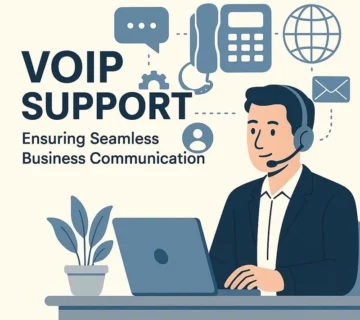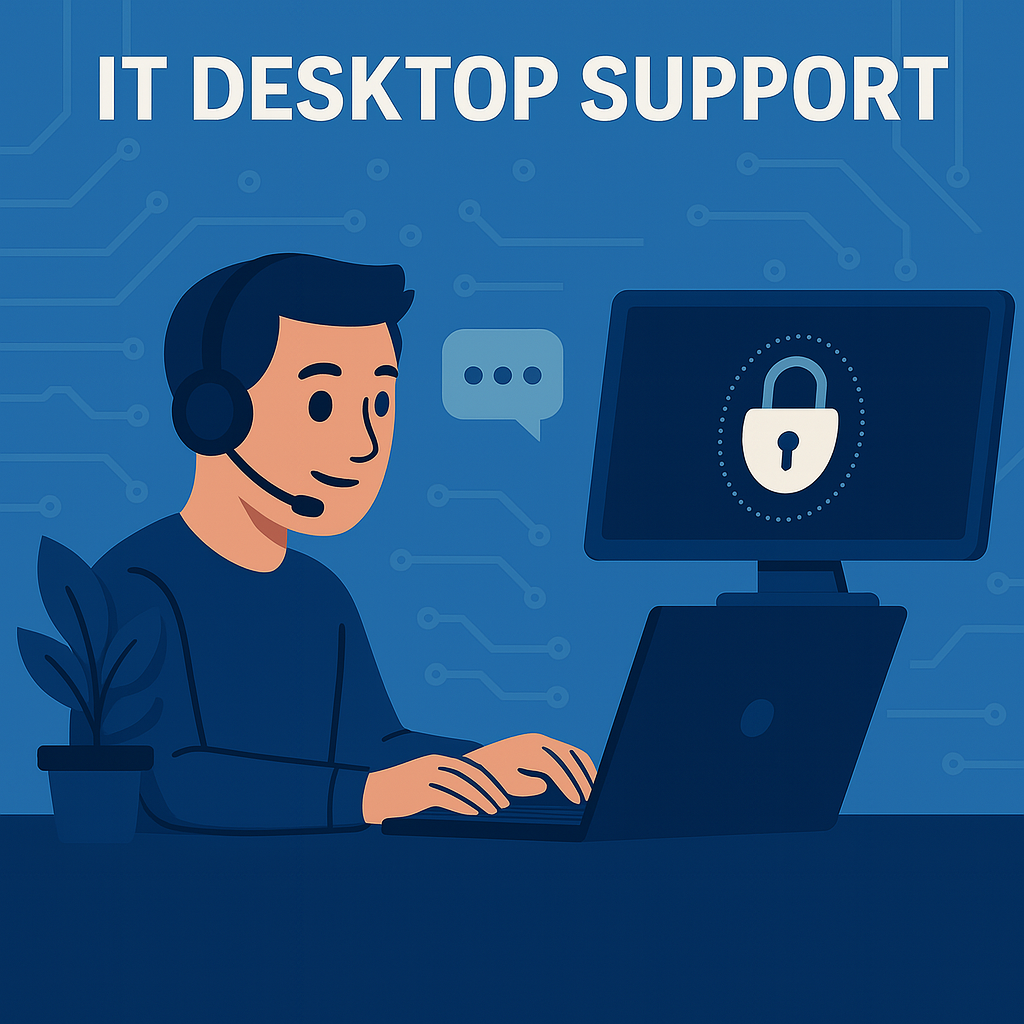Top VoIP Security Threats and How Support Services Can Prevent Them

VoIP (Voice over Internet Protocol) has transformed the way businesses communicate by offering cost-effective and flexible communication solutions. However, like any internet-based technology, VoIP is susceptible to security threats that can compromise sensitive data, disrupt operations, and lead to financial losses.
This article explores the top VoIP security threats and discusses how VoIP support services, including outsourced server monitoring and proactive server management, can help prevent them. We’ll also highlight the role of server support services in ensuring secure and reliable VoIP communication.
Understanding VoIP Security
VoIP converts voice signals into digital packets and transmits them over the internet. While this allows businesses to save costs and improve efficiency, it also introduces vulnerabilities that hackers can exploit.
To ensure security, businesses must integrate professional server support, reliable server solutions for businesses, and proactive security measures. Neglecting these aspects can expose VoIP networks to cyber threats, such as phishing attacks, call eavesdropping, and denial-of-service (DoS) attacks.
Top VoIP Security Threats
1. Eavesdropping and Call Interception
Attackers can intercept VoIP calls and extract sensitive information by exploiting unsecured networks. This can lead to data breaches, financial fraud, and reputational damage.
How Support Services Prevent This:
✔ Implementing end-to-end encryption (E2EE)
✔ Using VPNs for secure data transmission
✔ Employing proactive server management to detect vulnerabilities
✔ Conducting regular security audits
2. VoIP Phishing (Vishing)
Cybercriminals use VoIP phishing to trick users into revealing personal and financial details. Attackers often impersonate top business VoIP providers to steal customer credentials.
How Support Services Prevent This:
✔ Implementing caller authentication protocols
✔ Educating employees on social engineering tactics
✔ Deploying AI-powered fraud detection tools
✔ Utilizing outsourced server monitoring for threat detection
3. Denial-of-Service (DoS) and Distributed Denial-of-Service (DDoS) Attacks
These attacks flood VoIP servers with excessive traffic, causing service disruptions and downtime.
How Support Services Prevent This:
✔ Deploying firewalls and intrusion detection systems (IDS)
✔ Implementing traffic filtering solutions
✔ Using outsourced server support for rapid response
✔ Employing reliable server solutions for businesses to mitigate attacks
4. Spoofing and Caller ID Manipulation
Spoofing enables attackers to disguise their caller ID, making fraudulent calls appear legitimate.
How Support Services Prevent This:
✔ Enforcing STIR/SHAKEN authentication
✔ Implementing secure SIP protocols
✔ Utilizing outsourced server monitoring to detect anomalies
✔ Blocking known fraudulent numbers
5. Toll Fraud and Call Hijacking
Hackers exploit VoIP systems to make unauthorized calls, leading to high costs for businesses.
How Support Services Prevent This:
✔ Enforcing call authorization policies
✔ Restricting international call access
✔ Using multi-factor authentication (MFA)
✔ Monitoring call logs for suspicious activity
6. Malware and Ransomware Attacks
VoIP systems can be infected with malware or ransomware, crippling business operations.
How Support Services Prevent This:
✔ Deploying real-time malware protection software
✔ Performing regular security updates
✔ Implementing secure backup solutions
✔ Using server support services for advanced threat detection
7. Weak Passwords and Authentication Exploits
Many VoIP breaches result from weak passwords or poor authentication mechanisms.
How Support Services Prevent This:
✔ Enforcing strong password policies
✔ Implementing two-factor authentication (2FA)
✔ Using role-based access control (RBAC)
✔ Conducting regular security audits
8. SIP Trunking Vulnerabilities
Unsecured SIP trunking can expose VoIP systems to cyberattacks.
How Support Services Prevent This:
✔ Implementing encrypted SIP protocols (TLS & SRTP)
✔ Restricting SIP access to authorized users
✔ Using session border controllers (SBCs)
✔ Monitoring SIP traffic for anomalies
9. Insider Threats
Employees or contractors with access to VoIP systems can misuse their privileges.
How Support Services Prevent This:
✔ Implementing user activity monitoring
✔ Using privilege management solutions
✔ Conducting background checks on employees
✔ Educating employees on cybersecurity best practices
10. Poor Network Security
Unprotected networks can lead to VoIP vulnerabilities.
How Support Services Prevent This:
✔ Enforcing strict network segmentation
✔ Using firewalls and deep packet inspection
✔ Regularly updating firmware and security configurations
✔ Employing automatic intrusion prevention systems (IPS)
How VoIP Improves Small Business Efficiency
In addition to security, VoIP offers several advantages for businesses, especially startups and small businesses:
✅ Cost Savings – VoIP is more affordable than traditional phone systems.
✅ Scalability – Businesses can easily add or remove users.
✅ Flexibility – Employees can work remotely using VoIP.
✅ Integration – VoIP integrates with CRM and collaboration tools.
✅ Improved Customer Service – Advanced call management features enhance customer interactions.
For small businesses looking to adopt VoIP, top business VoIP providers offer solutions with built-in security features to ensure safe and efficient communication.
The Role of Server Support Services in VoIP Security
1. Server Support Services for VoIP
Professional server support services ensure that VoIP systems are secure and reliable by managing updates, monitoring performance, and preventing cyber threats.
2. Outsourced Server Support
Many businesses rely on outsourced server support to handle VoIP security, allowing them to focus on their core operations while experts maintain their infrastructure.
3. Proactive Server Management
By implementing proactive server management, businesses can detect and resolve issues before they impact VoIP performance.
4. Reliable Server Solutions for Businesses
Using reliable server solutions for businesses ensures uninterrupted VoIP services and minimizes security risks.
Flexible Equipment Financing for Secure VoIP Implementation
For businesses looking to implement secure VoIP solutions, equipment financing for startups can help them acquire necessary hardware without upfront costs. Options include:
✔ Flexible Equipment Financing – Financing options tailored to business needs.
✔ Flexible Equipment Leasing – Lease VoIP equipment with lower initial investment.
✔ Small Business Equipment Solutions – Affordable VoIP hardware for startups.
✔ Equipment Financing Startup Plans – Specialized financing for new businesses.
By leveraging flexible equipment financing or equipment financing startup programs, businesses can enhance their VoIP security infrastructure without financial strain.
FAQs
1. What is the biggest VoIP security risk?
Eavesdropping and phishing (vishing) attacks are among the most common threats.
2. How can outsourced server monitoring enhance VoIP security?
Outsourced server monitoring detects suspicious activity in real time, preventing security breaches.
3. Why is proactive server management essential for VoIP?
It ensures continuous security monitoring and minimizes downtime due to cyberattacks.
4. Can flexible equipment leasing help small businesses improve VoIP security?
Yes, it allows businesses to acquire high-quality VoIP equipment without large upfront costs.
5. What should startups consider when choosing a top business VoIP provider?
Security features, scalability, reliability, and customer support should be top priorities.
6. How does Windows PCs security disaster impact VoIP users?
If Microsoft ends support for Windows PCs, outdated systems become vulnerable to cyberattacks, putting VoIP security at risk.




No comment